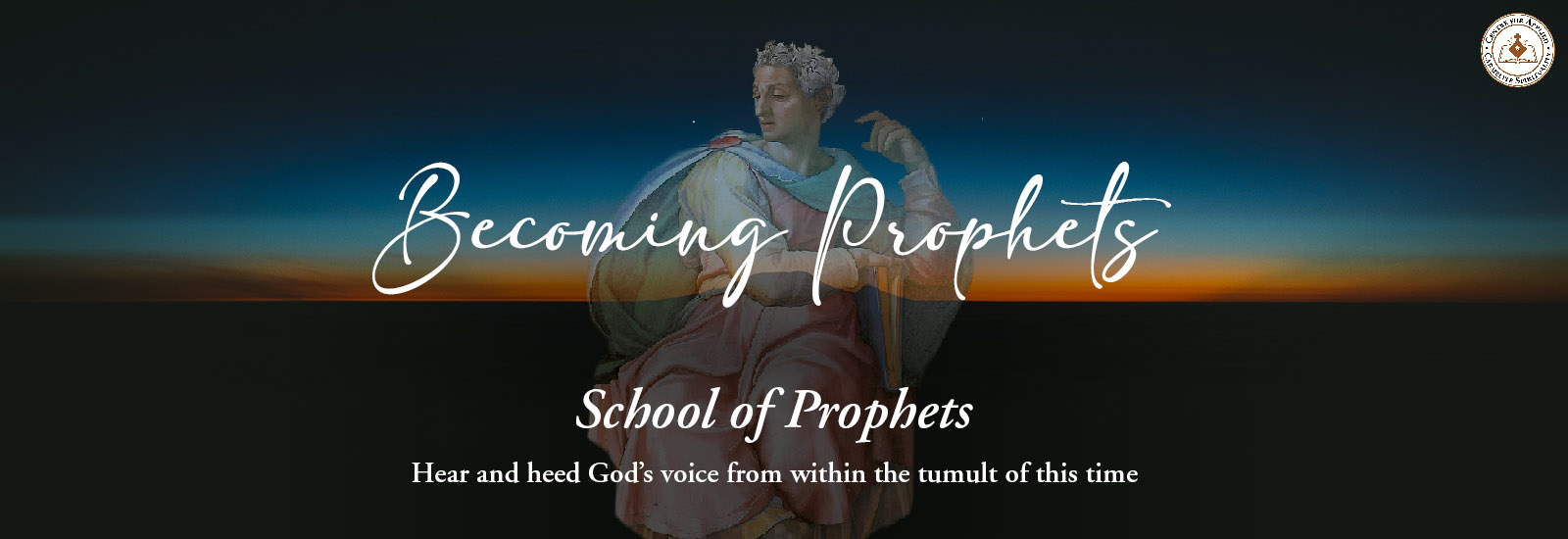REGISTER FOR THE 2026 – 2027 PROGRAMME BELOW
God’s Invitation — For Our Times
BECOMING PROPHETS
Our Vision
The School for Prophets aims to hear and heed God’s voice from within the tumult of this time. Practicing the prayer, study, and silent receptivity exemplified by the prophets, school-participants will examine the world as God sees it, and discern ways to speak God’s truth, for both what is needed and possible.
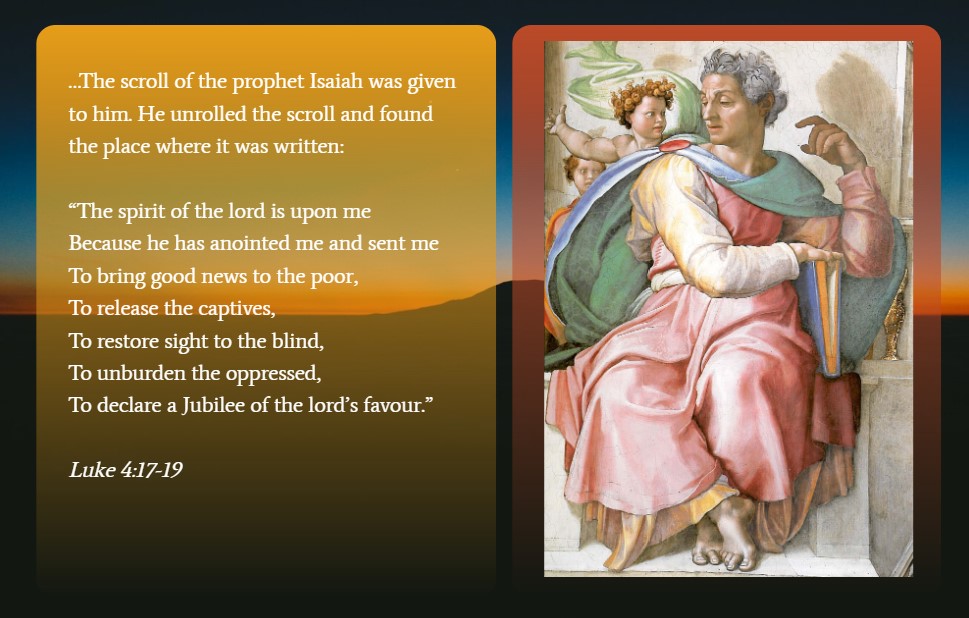
What does a Prophet do?
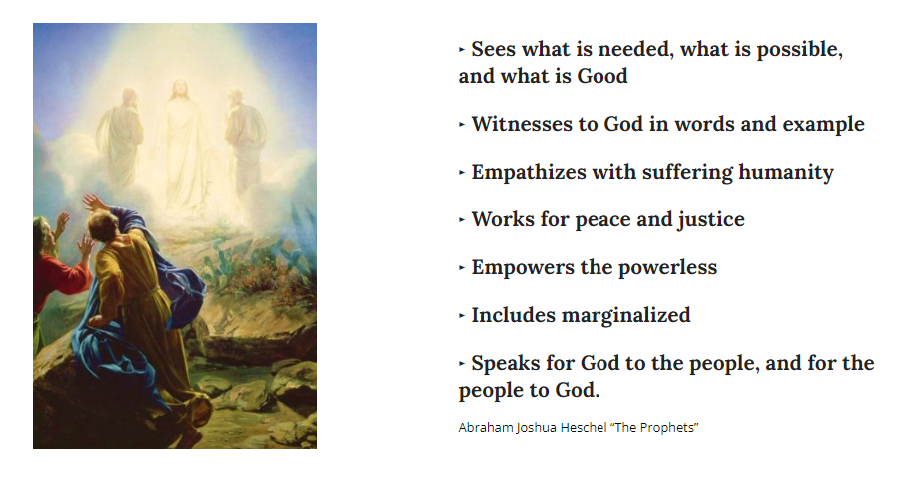
Aims of The School for Prophets
To prepare course participants — individually, and as a community — to exercise more fully their
Baptismal commission to serve as prophets to our world, and our Church.
Specifically:
‣ To grow in friendship with Jesus
‣ To learn from the example of prophetic figures in the bible and the Christian tradition
‣ To enhance the capacity for a life of witness to Christ — personally, and as a community
‣ To nurture the capacity for prophetic contemplation
‣ To develop a way of prophetic discernment
‣ To undertake both critique and creative visioning of our times through the lens of Catholic Social Teaching.
‣ To propose specific contributions towards prophetic witness in the world, and our Church
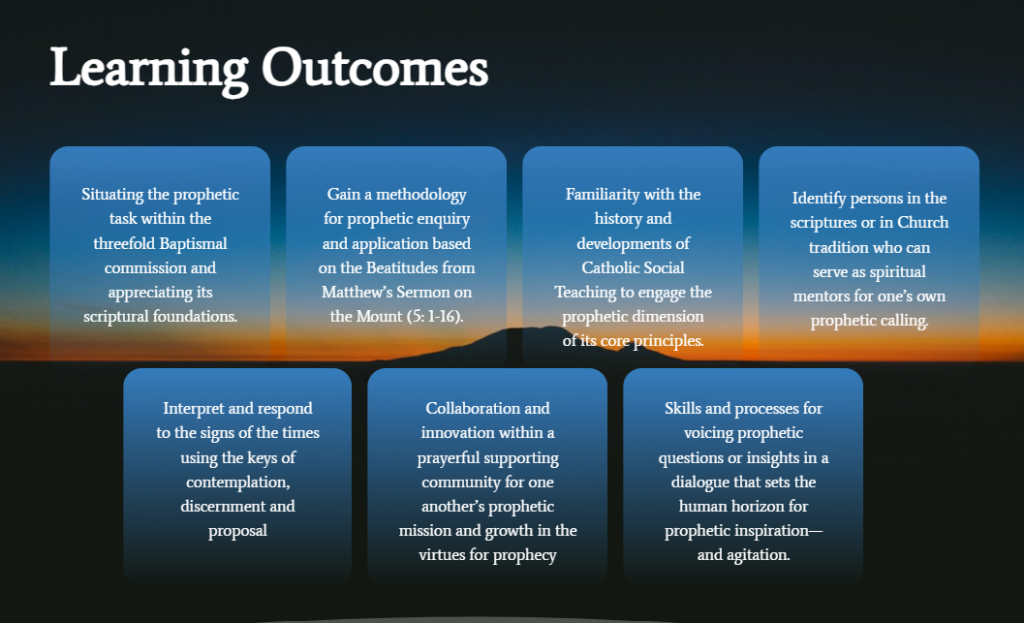
Key Features
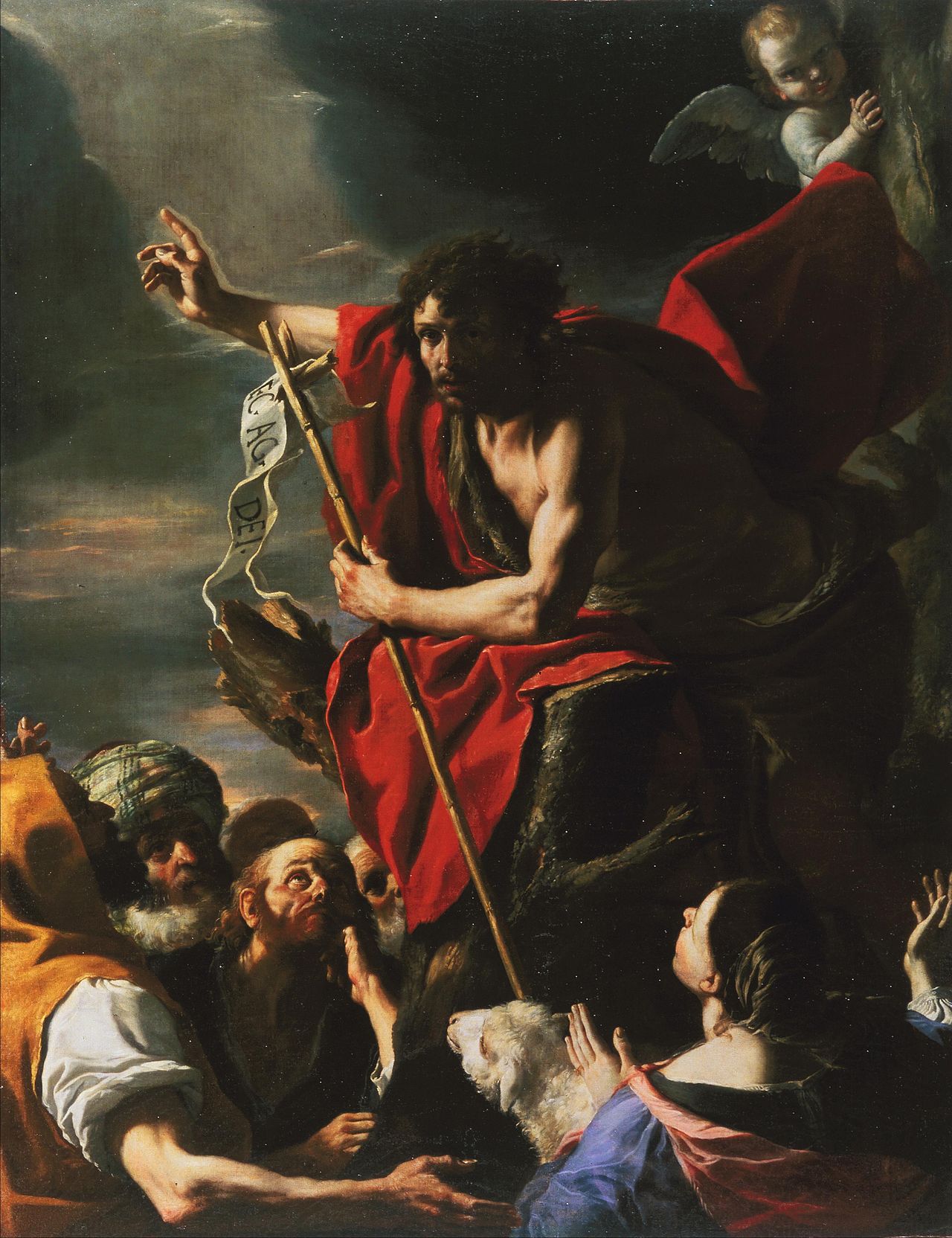
» Inspired by Scripture and the Living Tradition:
The curriculum draws on the experience of biblical prophets and saints from the Carmelite tradition. The Carmelite values indispensable to the prophetic commission – solitude, silence, community prayer, contemplation, collaborative work, presence, listening, discernment, welcoming, and integration – are at the heart of the programme.
» Applying Prayerful Enquiry:
The programme encourages a prayerful engagement with current social reality, fostering critical thinking from a spiritual perspective that addresses causes, and not simply effects.
» A Participative Model:
The frequent on-line sessions allow for building relationships and confidence in a community growing and learning together how to witness the movements of the Holy Spirit at this time.
» Catholic, Ecumenical and Inter-disciplinary:
Prophets operate at the boundaries between the religious and the social. This requires gathering input from a wide spectrum of sources, contemplating and processing these within the rich guidance of scripture and tradition, and making God’s presence and desires alive in the world.
» Communal Emphasis:
Learning and growing together in our prophetic calling and encouraging one another in the demands that prophetic truth-telling engenders.
» Led by a Religious and Lay Team:
Programme facilitators bring their insights and lived experience as lay and religious members of the Church to enrich the conversation with course participants.
» Creativity – Inspired and Inspiring:
Prophets not only tell truths that in God’s name must be spoken. They also conjure the latent potential for healing, wholeness, and holiness that reside in each human person created in the image of God.
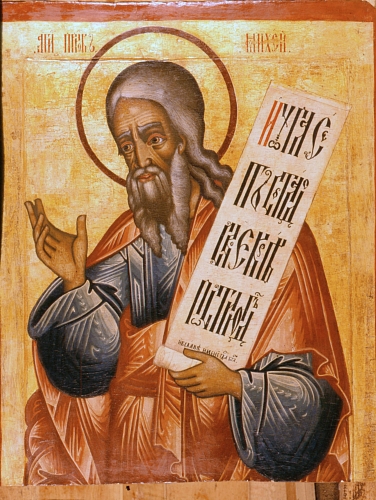
Giving Complexity Its Due
Contemplate
▸ Learning from the prophets in scripture
▸ Praying and applying the Beatitudes
▸ Lessons from the margins
▸ Inputs from the social sciences
▸ Applying one’s gifts and talents to God’s call
▸ Listening to those in distress or despair
Discern
▸ Horizontal stretching: Embracing the creative push-and-pull between consolation and desolation
▸ Vertical Stretching: “Putting on Christ” to feel “for, with, and in Him” the agonies and hopes of the world
▸ Interior stretching: To discover in prayer one’s prophetic mission
Propose
▸ Daring to dream with the audacity of Christ’s incarnation
▸ Elevating human dignity, solidarity, and the common good in concrete ways
▸ Using the prophetic tools of poetry and story to incite conversion
Course Outline – Preliminary Schedule
| Scriptural Foundations for The Prophetic Vocation | Growing in Contemplative Prayer to Hear God’s Whisper | The Prophetic Grace Bestowed at Baptism | Prophetic Saints and Their Example | Catholic Social Teaching as Prophetic Praxis | Posing Prophetic Questions |
| ‣ Lessons from the Biblical prophets ‣ Qualities, attributes, and patterns of prophecy ‣ The Beatitudes as a prophetic paradigm ‣ Prophetic theology and spirituality | ‣ Seeds of Prophetic Contemplation ‣ Invoking and attending to the Holy Spirit ‣ Spiritual and communal practices for Discernment | ‣ Prophetic gifts ‣ Prophetic calling ‣ Prophetic attributes and tools ‣ Prophetic responsibilities | ‣ Audacious vocations for the truth ‣ Creating communities of mission ‣ Transforming Church incarnating Jesus in time and place | ‣ Core principles from papal encyclicals ‣ Lessons from addressing ‘the signs of their times’ ‣ Lay advocates who put in practice innovations based on CST | ‣ Taking to heart the questions Jesus posed ‣ The ethical art of subversive questions ‣ Honing critical thinking, and self-critical re |
Sessions begins: 4:00pm (UK Time) ON SUNDAYS
| SESSION | DATES | CURRICULUM | |
| 0 | Nov 1, 2026 | Open Day | |
| 1 | Nov 8, 2026 | The Prophetic Vocation – Then & Now | CONTEMPLATE |
| 2 | Nov 22, 2026 | Introduction to the Biblical Prophets | CONTEMPLATE |
| 3 | Dec 6, 2026 | Encountering Jesus as Prophet | CONTEMPLATE |
| 4 | Dec 20, 2026 | Prophetic Qualities, Attributes & Challenges | CONTEMPLATE |
| 5 | Jan 3, 2027 | The Beatitudes as Prophetic Template | CONTEMPLATE |
| 6 | Jan 17, 2027 | Prophetic Prayer: Heeding Silence | DISCERN |
| 7 | Jan 31, 2027 | Forming a Prophetic Community | DISCERN |
| 8 | Feb 14, 2027 | Reading the “Signs of the Times” | DISCERN |
| 9 | Feb 28, 2027 | Discerning Prophetic Gifts | DISCERN |
| 10 | Mar 14, 2027 | Finding One’s Prophetic Voice | PROPOSE |
| 11 | Mar 28, 2027 | Catholic Social Teaching, Applied | PROPOSE |
| 12 | Apr 11, 2027 | The Ethical Art of Prophetic Questions | PROPOSE |
| 13 | Apr 25, 2027 | Receiving & Serving the Holy Spirit | PROPOSE |
| 14 | May 9, 2027 | Prophetic Contributions to the Church & Beyond | PROPOSE |
| 15 | May 16, 2027 | Commissioning |
Course Structure and flow
▸The programme is designed as one ninety-minute on-line session every two weeks.
▸On-line sessions will begin on November 8, 2026 at 4pm (UK time). There will be an open day session on November 1, 2026.
▸Each ninety-minute on-line gathering will involve 30 minutes of prayer, 30 minutes of instruction or guided reflection, and 30 minutes for questions and dialogue.
▸Participants will be invited to reflect with lessons learned about our current reality, to practice heeding the Holy Spirit in prophetic interpretation.
▸Commissioning will occur on May 16, 2027.
▸Prophetic lessons and insights from the programme will be complied by participants (in a creative manner to be determined by them) to begin together the process of dissemination and dialogue.
Cost
Price: £650
(Fees can be paid either in full in advance or in easy monthly installments)
For further support towards the cost of the programme please send an email to:
Fr Alex Ezechukwu OCD
admin@carmelite.org.uk
Please download our poster:
Our Team

John Dalla Costa is an author, theologian, and ethicist. For over a decade, John taught ethics at the Schulich School for Business at York University (Toronto). Currently, he is a member of an interdisciplinary team at the Pontifical University of St. Thomas Aquinas (Angelicum), working to give dimension to the new economy Pope Francis has envisioned in his social teachings.

Alexander Ezechukwu, OCD is a Carmelite priest and serves as the prior of the Carmelite community at Boars Hill, Oxford. Fr Alex is a trained spiritual director with many years of pastoral experience in guidance in the spiritual life. He holds a Licence in Sacred Scripture from the Pontifical Biblical Institute, Rome.
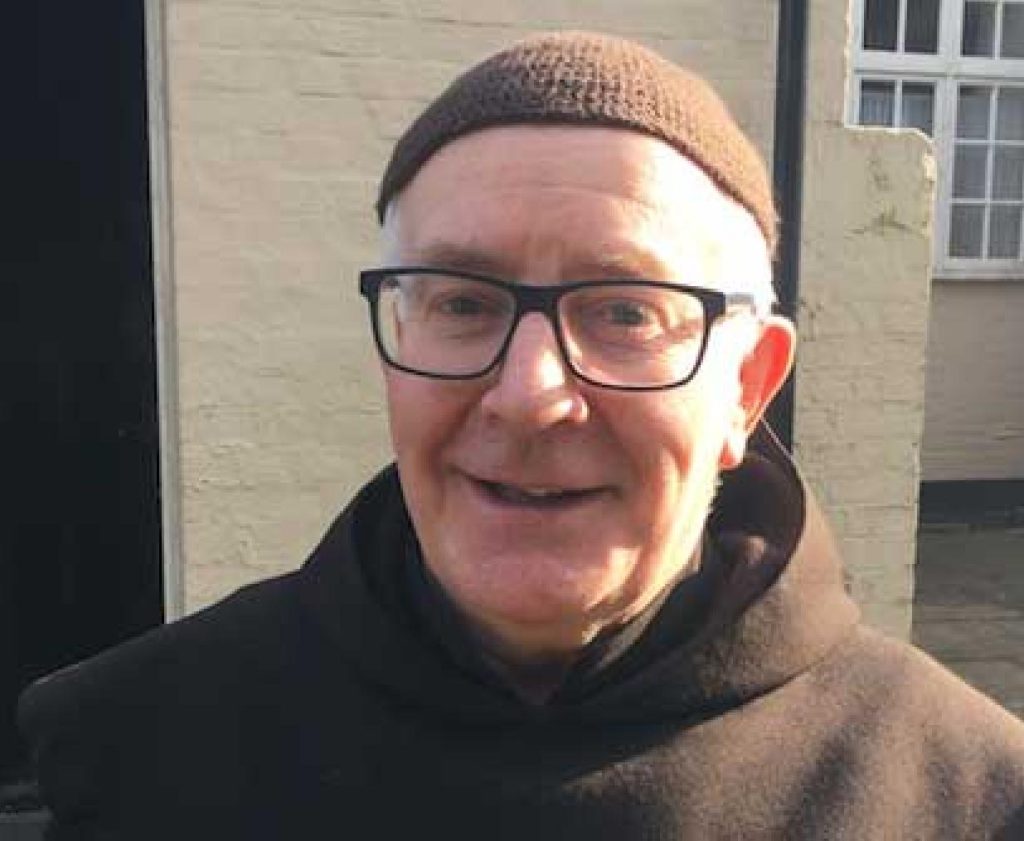
Fr Liam Finnerty, OCD is a Carmelite priest and holds degrees in Theology and Social Work from Milltown Institute, Dublin and Glasgow University, respectively. Fr Liam has many years of experience in the retreat ministry and mentoring.
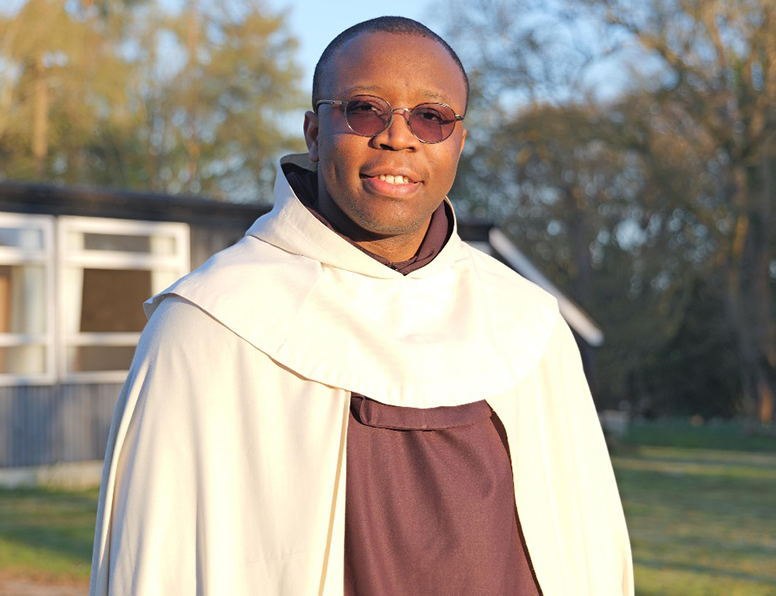
Friar Chidiebere JohnBosco Ezeakacha of the Holy Family is a Discalced Carmelite Friar. He holds a degree in Philosophy from The Dominican Institute, Ibadan, Nigeria. He resides at the Carmelite Priory, Oxford, while undertaking his Catholic Theology studies at the Blackfriars Studium, Oxford. He is also undergoing a training course in Spiritual Direction (Carmelite Tradition), while also training to be a Pastoral Supervisor.

